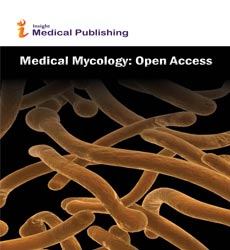Abstract
Subcutaneous Abscess as a Single Manifestation of Candidiasis
Candida is yeast responsible for the majority of the systemic invasive fungal infections in humans. The incidence of systemic Candida infections has increased, probably due to a rising number of patients with comorbidities and risk factors for invasive candidiasis. Candidemia is a life-threatening infection with high morbidity and mortality especially in individuals at greatest risk of fungal infection, such as patients receiving cancer chemotherapy, immunosuppressive therapy, prolonged antibiotic therapy, neutropenia, recent abdominal surgery, hematological malignancies, central venous catheter, receipt of corticosteroids, parenteral nutrition, etc. In patients infected with the human immunodeficiency virus (HIV) the predominant clinical forms of candidiasis include the mucosal involvement as oral candidiasis, oesophageal candidiasis, Candida vaginitis and Candida balinitis [1]. Although subcutaneous abscess due to Candida species is frequent in non-neutropenic patients after transient candidemia, it is a rare complication in immunocomprimised patients due to HIV/AIDS disease. The few cases reported in the medical literature occur as a complication of bacterial cellulitis, iatrogenic injury, trauma or intravenous drug abuse [2]. We present the clinical history of an HIV patient who developed a subcutaneous abscess due to Candida albicans without fungemia or other focal manifestation of this mycosis.
Author(s):
Marcelo Corti,Maria F Villafane,Fernando Messina and Ricardo Negroni
Abstract | Full-Text | PDF
Share this

Google scholar citation report
Citations : 164
Medical Mycology: Open Access received 164 citations as per google scholar report
Abstracted/Indexed in
- Google Scholar
- China National Knowledge Infrastructure (CNKI)
- Directory of Research Journal Indexing (DRJI)
- WorldCat
- Publons
- Geneva Foundation for Medical Education and Research
- Secret Search Engine Labs
Open Access Journals
- Aquaculture & Veterinary Science
- Chemistry & Chemical Sciences
- Clinical Sciences
- Engineering
- General Science
- Genetics & Molecular Biology
- Health Care & Nursing
- Immunology & Microbiology
- Materials Science
- Mathematics & Physics
- Medical Sciences
- Neurology & Psychiatry
- Oncology & Cancer Science
- Pharmaceutical Sciences
